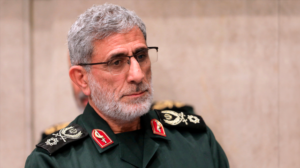The news that the head of the elite Quds Force of the Revolutionary Guards was unharmed a few days ago would at other times have created – artificially or even naturally – a revolutionary or at least jubilant mood in Iran. The speeches would have been traditionally “fiery” and en masse – voluntarily or otherwise – the people would have flooded the streets of Tehran.
But everything has changed in the region over the past year. Esmail Qaani gave signs of life after five days when everyone thought he was dead under tons of rubble in Beirut’s southern suburbs, but his return to his country was accompanied by arrest, interrogation and a heart attack that sent him to a Tehran hospital ward. The “whispers” that the most powerful man after Iran’s religious leader is a spy became loud cries and Israel now strikes its enemies even without killing them…
Tehran has yet to accept the immediate response – attack for the 200 ballistic missiles it has launched against Israel and yet it now looks as battered as ever by Tel Aviv. The theocratic regime and the Ayatollah caste has demanded that the political leadership, military and intelligence agencies immediately find the spy-collaborator who has been giving Israel’s intelligence services in the last month lavishly critical information not just about Iran but about the entire system of the so-called “Axis of Resistance.”
For Israel, the “first blood” – message – was shed last July (on 31 July in particular) when, in a strike of absolute temporal and local precision, Ismail Haniyeh was killed in a Tehran apartment that Tel Aviv’s intelligence services had booby-trapped. Tehran may have been upset but initially attributed the leak of Haniyeh’s location to a third party.
But the massed strikes with pagers and short-range radios in mid-September in the heart of Beirut, as well as the deaths of Nasrallah and his successor, signaled a red alert for a major leak, and by a major player in Iran. For Tehran, the blow, despite occurring far from its own soil, has opened a wound that is unlikely to heal immediately.
Israel, regardless of whether it has managed or not to reach or even “turn” Iran’s chief of the “Elite” into a pawn, has won a victory for which it did not have to fire half a bullet. The fear is the most insidious and usually an unbeatable enemy. The introspection that characterizes the theocratic regime in Tehran is a given will lead to knee-jerk moves and these are now another weapon and a more powerful one than the “natural” ones in Netanyahu’s hands.
Whether Qaani is or isn’t a Mossad agent matters little for the unfolding developments, as it’s clear that, for Iran, there are only two options: either he is, in which case he will be tried and face the ultimate penalty, or he isn’t, but will still meet the same fate, as only a “scapegoat” can distract attention until the real culprit is found.
At the end of the day, Israel wins this particular crucial game no matter what its great rival claims.
Ask me anything
Explore related questions





